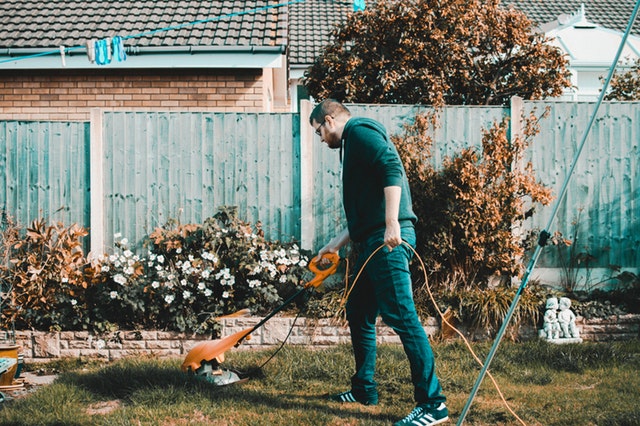Kids don’t want to do chores. That’s a fact. Expect this. That doesn’t mean let them off the hook. It is essential for our kids to be contributing members of the family to develop an investment in and consideration for their family members. A family is a team. When you are on a team, every team player is important to the working of the whole.

But when you yell, bribe, or threaten them to do their chores, the underlying assumption is that they should want to but they don’t. This unrealistic expectation means you will yell when that expectation is not met. But if you understand that kids don’t want to do chores, you will be more effective at ensuring they get to work.
Remember when your toddlers and preschoolers begged to run the vacuum, fold laundry, wash windows, and sweep the floor? It would have taken the entire morning and you’d have to do it over anyway. You didn’t have the time or patience so you got them out of the way to just get it done. Well, you might have missed your chance. Little children want to help — until we make them.

By the time they are capable of doing a decent job, time has elapsed since toddler enthusiasm, and they no longer want to be with you every minute of the day. They are into their own thing and household tasks take them away from their own thing. Of course they don’t want to.
Now, you know your kids are going to fight you, moan, and complain when you ask them to do their chores. Who wants that? Plus you’ll have to police them, and then what if they don’t do them? That’s when consequences come in to play — usually taking something away that they care about, which turns into a battle and you erode any inkling of desire. Certainly no self-esteem is developed.

Requiring help is not about teaching them how to clean house or making them do chores for the sake of doing chores. Your kids will most likely keep a decent house one day even if they never clean yours. And they will learn to do what has to be done when it’s their responsibility. Requiring help is about helping. It’s about team work, taking on responsibilities to help the team run more smoothly. It’s about the relationship a child has with his family. It’s about seeing oneself as a helper. A helping child will be far more invested in family events and planning when she feels like an important member of the team, and she will feel more connected to her family as a source of support (the most important protective factor in anything you fear for your child).
It feels good to know that you help your family out. You feel proud of being needed, of doing things that save time for someone else. I once overheard my twelve-year-old son and his friend trying to best each other as they compared household jobs, griping as their chests swelled. That doesn’t mean they want to or would offer help if you didn’t require it. Don’t expect the offer to help for many years. Instead expect grumbling.
Here are some key points to help your kids be better helpers:
- Ditch the word “chores”. No one wants to do chores, but people like to be helpful, useful. Use “help” or “jobs”.
- Understand and be considerate of their agendas, even things you hate them doing or think of as trite. Remember, your child’s agenda is as important to him as yours is to you. Expect them to want to play rather than help.
- A child’s job is to get what she wants, when she wants it. We are all like that. Maturity opens the perception that other people want what they want, too. So, consideration and compromises become necessary for relationships. You don’t have to teach your child this (the teaching comes in the doing), and if you try too early, your attempts will fall on deaf, egocentric ears.
With toddlers and preschoolers:
- When they want to help “clean” let them as often as you can. Your time now is worth the investment in raising a helper. Try to keep them in the helping mode as they grow more capable of difficult tasks.
- Set up challenges.
- Who wants to put cups on the table?
- and Mrs. Potato Head need to go back in their “house” for the night. Do you want to make them a bed?
- Would you like to help me fold the laundry today? You could pick which colors you want.
- How would you like to sweep with the broom while I finish the dishes?
- Let’s get the bucket. I’ll throw in all the red legos. What color do you want?
- Do you want to spread the peanut butter yourself or would you like me to help?

These are genuine questions. They are meant to entice. If your child doesn’t want to, don’t force it. Encourage the enjoyment of doing what you ask instead of the chore of it. “Put your toys away” is a demand and will get resistance.
- Use motivation instead of threats to insure they do what they shouldn’t be expected to want to do. “
- After you put the wrapper in the trash, I’ll give you the granola bar.
- As soon as you your teeth are brushed, I’m going to tickle you silly.”
- Expect and allow forgetting. Don’t set up for failure. Asking a young child to feed a pet is problematic unless it’s spontaneous. “Would you like to feed Fido tonight?” instead of “Your job will be to feed Fido.”

With kindergartners on:
- Stick with motivating, not threatening. “As soon as you get your toys put away, we can watch that show.”
- Own your wants. “I would like you to set your place at the table. That helps me and makes my job easier.” Not, you need to….
- Ask for help on the spot. “Can you bring that bag of groceries in the house? That way I don’t have to make another trip.”

When old enough for household jobs:
- Make a list of age-appropriate things you would like help with. Ask your kids which ones they prefer. Offer a change-up plan each week.
- Don’t blame or criticize but do make it a you-help-me/I-help-you situation. “I’m happy to take you to Sam’s as soon as the dishwasher is empty.”
- Allowance is not for household responsibilities. Money is an extrinsic motivator, the feeling of being helpful is intrinsic. Allowance stands alone and is for learning about money. Give extra money for extra jobs not normally expected.
- Use dry-erase boards to list jobs that can be checked off when done.
- Together go over the past week and ask what worked and what didn’t. “I really needed the trash taken out sooner. What can we agree on as a time for taking it out?”
- When resistance is high, use problem solving. “What we decided on for jobs is not working. They are not getting done, and I don’t want to be left doing everything. I don’t think that is fair. What can we agree on that feels fair to all of us?” Stay at the table until jobs (and when they will be done) are agreed on. Keep reevaluating if things are not working.
Be sure and express appreciation for their specific help (not, “Good job!”). Focus more on when they are helping rather than when they are not so their helping grows. When they feel your disappointment, they will stop trying. When they feel helpful, they will see themselves as helpful.
 The When Your Kids Push Your Buttons Audio Course
The When Your Kids Push Your Buttons Audio Course
Have you ever asked yourself, “Why did I DO that??”
Wish you knew what else to do?
Learn to:
- Understand your reactions and gain control of them
- Interpret your child’s behavior
- Set appropriate expectations
- Defuse your buttons
Related Articles:
June ’18 Q&A – Refusing the Toilet, Unrealistic Expectations and Huge Feelings







